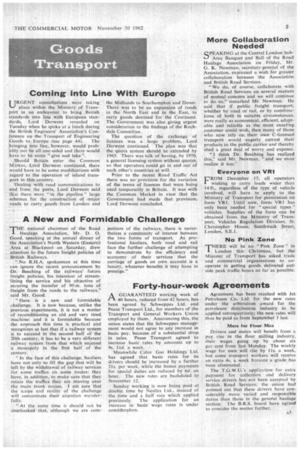Coming into Line With Europe
Page 7

If you've noticed an error in this article please click here to report it so we can fix it.
URGENT consultations were taking place within the Ministry of Transport in an endeavour to bring British standards into line with European standards, Lord Derwent revealed on Tuesday when he spoke at a lunch during the British Engineers' AssoCiation's Conference on the Transport of Engineering
Goods to Europe (see page 44). The bringing into line, however, would probably not be all one-sided and there would have to be some "give and take ".
Should Britain enter the Common Market, Lord Derwent continued, there w'ould have to be some modifications with regard to the operation of inland transport in this country.
Dealing with road communications to and from thc ports, Lord Derwent said that there were "in the pipeline" large schemes for the construction of major roads to carry goods from London and the Midlands to Southampton and Dover. There was to be an expansion of roads in the North East and in the East, to carry goods destined for the Continent. The Government was also giving urgent consideration to the findings of the Rochdale Committee.
The question of the exchange of licences was a large problem, Lord Derwent continued. The plan was that the quota system should be extended by 1965. There was talk of having, by 1970, a general licensing system without quotas, so that operators could go in and out of each other's countries at will.
Prior to the recent Road Traffic Act there was no provision for the variation of the terms of licences that were being used temporarily in Britain. It was with the Common Market in ,view that the Government had made that provision, Lord Derwent concluded.




































































































